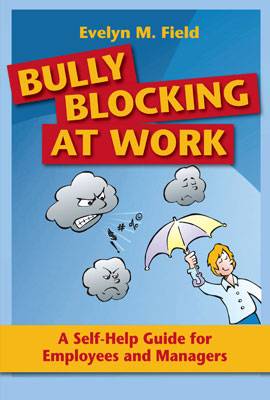Bully Blocking at Work

Bully Blocking at Work
A Self-help Guide for Employees and Managers The recent charges against four employees accused of bullying a young Victorian woman, eventually driving her to commit suicide, highlight the need for greater education about workplace bullying for managers and employees.
According to recent reports one in six people experience some form of mental or physical abuse in the workplace, but most are unsure how to deal with the problem. For Australian employers this results in billions of dollars in lost revenue, poor productivity and a high staff turnover. Most workplaces don't have systems in place to identify and solve bullying, leaving the victims with few options, and the culprits professionally incompetent.
Released in April, Bully Blocking at Work is a self-help guide for readers looking to understand and confront bullying within their workplace. Written by renowned Melbourne psychologist and author Evelyn M. Field, it provides a research-based, balanced and comprehensive overview of workplace bullying that deals with both prevention and treatment.
Featuring a range of real-life stories, humour, questionnaires, cartoons and sample retorts, Bully Blocking at Work is an indispensible resource for Managers and Employees looking to educate themselves on how to solve this growing problem.
Evelyn M. Field is a practising psychologist with extensive clinical and personal experience in dealing with the trauma of loss and abuse. She has been helping workplace bullying victims for over 30 years as well as training and writing about both workplace and school bullying. She regularly presents at international conferences and workshops. Her previous books on school bullying, 'Bully Busting' and 'Bully Blocking' are both bestsellers, and now published in five languages. Evelyn lives in Melbourne.
Bully Blocking at Work
Australian Academic Press
Author: Evelyn M. Field
ISBN: 9781921513442
Price: $29.95 
Interview with Evelyn M. Field
Why did you decide to write a book about bullying and the workplace; how serious is this issue?
Evelyn M. Field: I have written two books about school bullying and I thought that was bad and then I came across cases of workplace bullying and I was actually bullied about my first book and thought 'My Goodness! It is far worse in the workplace', that is what lead me onto it. Paul McCarthy, who has written about workplace bullying, said "we need a book, like your first two books for the workplace."
When you conducted your research were you surprised to find that "one in six people experience some form of mental or physical abuse in the workplace"?
Evelyn M. Field: Not really, one in six kids are bullied at school obviously not much changes when they get to work; in fact in some workplaces it is much higher. There is often more bullying in the workplace than the school ground.
A mother told me two weeks ago that her young son working in a well-known Sydney restaurant was told 'suicide is an option' and 'fear is a good motivator'; nothing has changed.
Could you share your top tips for what employees, who are being bullied in the workplace, should do?
Evelyn M. Field: It is about a number of options, first of all:
Take a record of absolutely everything.
Report it to your GP.
Get legal and union advice.
If it is safe, talk to the person and say "look, I don't like it when you yell or scream at me, or exclude me and put me down in front of others". Then, read the feedback, do they care or don't they care?
How can managers and employers ensure there is are no bullies or bullying in their workplace?
Evelyn M. Field: What managers have got to realise is that happy staff work better and at the end of the day, who gets the praise? It's the manager! It is in the manager's best interest to make sure their staff feel safe and happy. It is a manager's job that is what they are being paid to do, to make sure his staff feel safe, happy and respected.
If the manager is a bully, then it is up to their manager to find ways of improving their management skills. You could not pay them, because really if you are managing staff it is so they work better.
How were you able to collate real-life stories of bullying in the work place to use in this book?
Evelyn M. Field: I did a variety of things. First of all I did interviews with people who offered me their stories. Secondly I interviewed clients and clients gave me their story. Thirdly I got stories from some websites and bullying support groups around the world.
What did you find was the most common method of bullying?
Evelyn M. Field: I don't think there is a common method; I think the verbal and exclusion bullying are probably the worst. The verbal being put downs, devaluation, making people feel bad or humiliating. The exclusion bullying being excluding someone from groups, from jobs and from fair shifts. Those two, the verbal and the exclusion are probably the most common.
Is the degree and way bullying is conduct different between schools and the workplace?
Evelyn M. Field: In some ways they are very similar, I think that at school you can easily move to another school and there are usually options; you usually have either Mum or Dad around, when you are an adult you are much older and it is hard to learn new ways of behaving. When you are in a work place you may have a mortgage and there might not be other jobs to go to, which restricts you. I think there is a sense of unreality, 'I can't believe it is happening to me' and in fact, most victims of school bullying are vulnerable people. People that are bullied at work can be very strong people, warn down over a period of time, they have good social skills and are hard workers, they are very different to the targeted school bullying, in many cases.
Is it important that outsiders step in if they see bullying occurring in the workplace?
Evelyn M. Field: It is very good to do if one feels confident and it is safe to do so. It may be directly to the bullying, saying "Hey Jack, you are making Mary or Bill feel unhappy, do you mind tell them what to do in another way?" or reporting the bullying to someone else and saying "Look, I feel uncomfortable when I watch this going on at work." In regards to exclusion it is important to say "Oh, have we included so and so?" It is really important; we should always be encouraging the bystander to take a more active role.
How does bullying directly affect an organisation?
Evelyn M. Field: First thing is, when people are miss-managing others very often they are doing it because they are threatened by a confident employee and they may be good at their own job but they are not good at managing people, which means they are incompetent in what they are doing. Sometimes people bully to cover up their own mistakes, they don't like people working hard, so they destroy the other person, so their own work doesn't stand out as being poor in comparison.
Is it possible some managers do this without even knowing?
Evelyn M. Field: I'm sure. They see competition and they try and get rid of the competition.
How else does bullying directly affect an organisation?
Evelyn M. Field: Absentee, you have people taking time off and you have people wasting time on the job, you have people retiring early or moving to another job taking clients, customers or secrets with them. You also may find you have people not reporting problems, when they are meant too; or you have people making very expensive mistakes because they are scared, so they follow along, rather than challenging their supervisor or manager.
At the end of the day, you have people talking about the bullying too; for example the Sydney Apprentice board knew that a particular chef is a real bully, which made him known in the industry and now he will not attract good chefs because a good chef will say "why should I work there, there is lots of bullies there!"
You have things like absentee rates, sick days, work cover rates and higher insurance rates, as well as people that are scared to work together as a team- performance will go down where there is bullying. Obviously productivity will go down, no one is going to work hard for someone that they are scared of. It is all very expensive.
On the other hand, when managers listen to their staff and treat them with respect and therefore people enjoy going to work, the profits have to go up. Let's face it if I was being bullied, I wouldn't stay back, I'd just do the minimum and take my full lunch break, I'll just do a average job.
How does bullying affect an individual?
Evelyn M. Field: What we have found is that many people identify that they are being bullied but it is very hard to put it into words that they are being bullied. They will ask 'what is going on here, is this fair?' It becomes a major problem if no action is taken because they put up with bad behaviour for a period of time and finally when it gets to them they get angry and it can escalate. Often then the employer bullies them back and says 'Oh, you're not performing well' or 'you came to work late, four years ago, after your mother's funeral' - pathetic reasons. The person will begin getting more and more injured and by this time they will have been affected intellectually, they cannot concentrate, they cannot learn or remember and they are affected emotionally and often get stressed, traumatised or depressed. The will often develop physical disorders such as over-eating, over-drinking, sleep problems and panic attacks. Those that get bullied will also see their social life going down, they won't mix with people in and outside of work and there whole mental, physical and emotional well-being deteriorates.
Some people are clever enough to find another job and move on, but many of them are so bad that they have to go onto work cover because they are so sick and they can be on work cover for eight to ten years. Guess who pays for that? We do!
You will have someone who is really healthy, until the bullying began, and suddenly they cannot work anymore- they are a different person. There personally has totally changed and when they go out in the street they think they're in a warzone, even though the bullying may have finished eight to ten years ago.
A lot of good people are seriously affected by this, they are traumatised and some will never work again.
Many people don't realise they can't cope with the bullying and those that are conducting the bullying don't often know what they are doing and don't often mean to do it. What is really means is that if you are being bullied you have to identify it in your gut and take action, whether you confront, leave or report. Whatever you do, don't sit there and do nothing.
How will your book tackle bullying and bullies in the workplace?
Evelyn M. Field: I think it is about alerting people to the fact that bullying is bad for organisations and individuals and there are options for both. At the end of the day it is about not injuring people as much and improving performance and productivity, which is obviously what employers are interested in.
MORE





